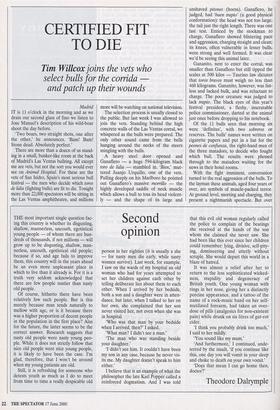THE most important single question fac- ing this countty is
whether its disgusting, shallow, mannerless, uncouth, egotistical young people — of whom there are hun- dreds of thousands, if not millions — will grow up to be disgusting, shallow, man- nerless, uncouth, egotistical old people; because if so, and age fails to improve them, this country will in the years ahead be an even more unpleasant place in which to live than it already is. For it is a truth very seldom acknowledged that there are few people nastier than nasty old people.
Of course, hitherto there have been relatively few such people. But is this merely because man tends naturally to mellow with age, or is it because there was a higher proportion of decent people in the population in the first place? Alas for the future, the latter seems to be the correct answer. Research suggests that nasty old people were nasty young peo- ple. While it does not strictly follow that nice old people were nice young people, it is likely to have been the case. I'm glad, therefore, that I won't be around when my young patients are old.
Still, it is refreshing for someone who detests youth as much as I do to meet from time to time a really despicable old
Second opinion
person in her eighties (it is usually a she — for nasty men die early, while nasty women survive). Last week, for example, I saw on the wards of my hospital an old woman who had for years attempted to set her children against each other by telling deliberate lies about them to each other. When I arrived by her bedside, both a son and a daughter were in atten- dance, but later, when I talked to her on her own, she complained that her son never visited her, not even when she was in hospital.
'Who was that man by your bedside when I arrived, then?' I asked.
'What man? I didn't see a man.'
'The man who was standing beside your daughter.'
'I didn't see him. It couldn't have been my son in any case, because he never vis- its me. My daughter doesn't speak to him either.'
I believe that is an example of what the philosopher the late Karl Popper called a reinforced dogmatism. And I was told that this evil old woman regularly called the police to complain of the beatings she received at the hands of the son whom she claimed she never saw. She had been like this ever since her children could remember: lying, divisive, self-pity- ing, domineering and utterly without scruple. She would depart this world in a blaze of hatred.
It was almost a relief after her to return to the less sophisticated wicked- ness, stupidity and degeneracy of British youth. One young woman with rings in her nose, giving her a distinctly porcine appearance, and a tattoo of the name of a rock-music band on her self- mutilated forearm, had taken an over- dose of pills (analgesics for non-existent pain) while drunk on six litres of gut-rot cider.
'I think you probably drink too much,' I said to her mildly.
'You sound like my mum.'
'And furthermore,' I continued, unde- terred by the insult, 'if you continue like this, one day you will vomit in your sleep and choke to death on your own vomit.'
'Does that mean I can go home then, doctor?'
Theodore Dalrymple










































































 Previous page
Previous page